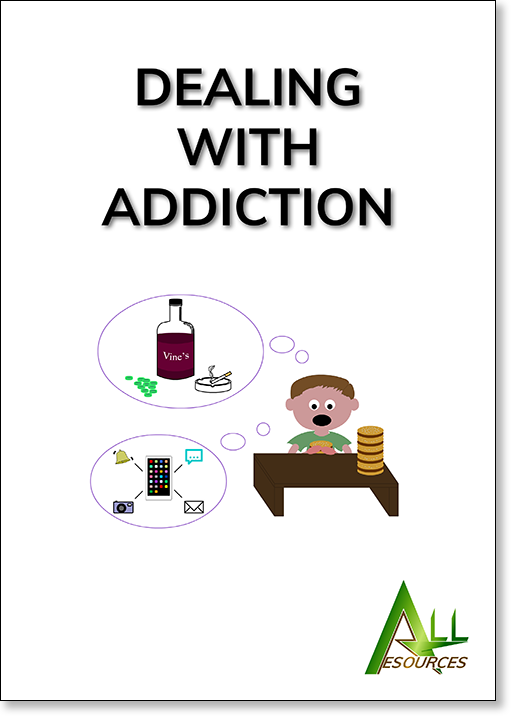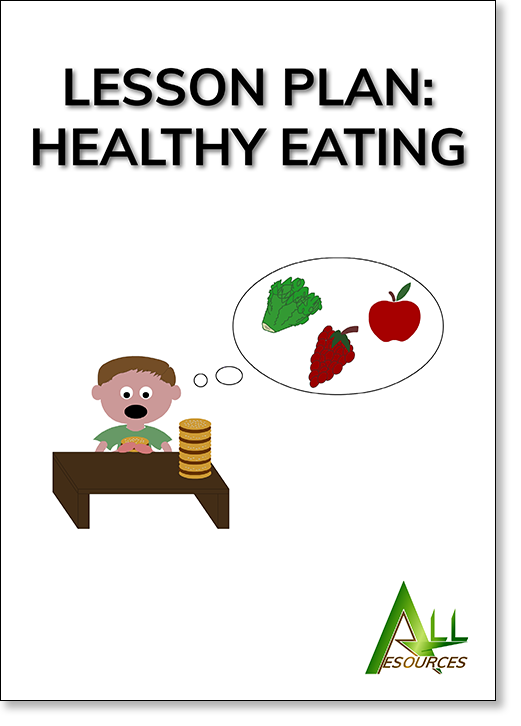Food Addiction

Dealing with Addiction
Providing the facts about substance abuse, gambling, gaming & food addiction as well as how to help people recover from addiction.
- Age range: 12 years and upwards
- Category: Schools
- Last revised: 2021
- Pages: 83
- Illustrated throughout
Hard copy: £35.99 add to basket
Food Addiction Lesson Plans

Healthy Eating
This lesson plan covers healthy eating, different food types and how to develop a healthy diet.
- Age range: 12 years and upwards
- Category: Lesson plan
- Last revised: 2021
- Pages: 15
- Duration: 55 mins – 1 hour
Hard copy: £10.99 add to basket
We eat to stay alive. This is a fact. Good nutrition is a vital aspect of our wellbeing and poor dietary habits can lead to all sorts of health problems. However, a poor diet does not necessarily mean eating too little, rather it means eating too little of the right foods and too much of the wrong foods. As with a whole host of other addictions, a person can become addicted to food when they become overly-dependent on certain types of food. So what exactly is food addiction?
What is Food Addiction?
Food addiction is an eating disorder and a mental health condition.
People who are addicted to food cannot control the amount of food they eat or even what they eat. A food addict will eat even when they are not hungry and they will lie to family and friends about the amount they eat. They will feel ashamed and embarrassed about their addiction which leads to feelings of guilt and depression. It is vital they seek help as soon as possible.
With most addictions, there is a specific substance that triggers the addiction such as nicotine in cigarettes or the alcohol content in alcoholic drinks. However, there is no such addictive substance in food, Therefore food addiction is a behavioural addiction and not a substance addiction. While the majority of food addicts are overweight and/or obese, there are some who are underweight, while others manage to maintain a normal, average weight for their size and shape.
People who suffer with food addiction are usually addicted to foods rich in sugar or salt and also high in fat. When they eat their chosen food it triggers a chemical reaction in their brain which makes them feel calm, happy and satisfied. They therefore eat more of this foodstuff in an attempt to intensify their feelings of wellbeing, thereby setting off a vicious circle. Because these foods are high in calories, they eat far more than is necessary to maintain health and the weight piles on.
Food Addiction Symptoms
Addiction to food has symptoms very similar to other addictions as follows:
- Eating in secret
- Lying about the amount you eat or the types of food eaten
- Eating alone and reluctant to eat with family or friends
- Eating when not hungry
- Eating even if it makes you feel ill
- Feelings of irritability and restlessness
Food addiction can lead to a number of physical, mental and emotional issues such as:
- Obesity
- Heart disease
- Diabetes
- Digestive problems
- Depression
- Anxiety
- Low self-esteem
As with all addiction, help is available. Your GP will be able to point you towards local support groups. You may need to see a counsellor or other health professional, and they may refer you to a treatment centre. As with all addiction, admitting there is a problem is the first, crucial step towards getting the help you need.



